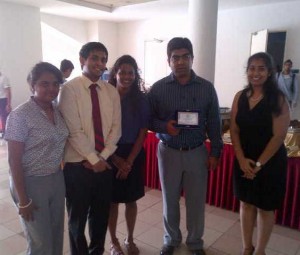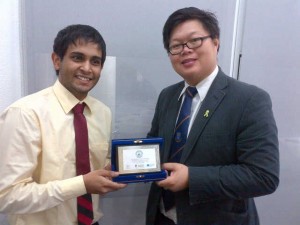May 29, 2013, by sustainablenottingham
Malaysia Campus Student Association holds first Sustainability Conference
Dr Svenja Hanson, chair of the Malaysia Campus environment committee, talks about the Student Association’s first Sustainability Conference.

Conference organisers Chalani Ranwala, Tharaka Hettiarachchi, Dhurga Narayanan and Himshikha Singh with Dr Asgar Ali
We should put our hands together for a resounding round of applause for the 2012/13 SA Education Officer, Chalani Ranwala, the SA Diversity and Environment Officer, Tharaka Hettiarachchi, and their teams at the SA Education Network and the Student Environment and Equality Network for bringing together the inaugural Sustainabilty Conference at the Malaysia Campus.
When I was first approached, little over a month before the event planned for 28th April 2013, I was doubtful it could be pulled off in so short a time. But they did it! Speakers to cover three of the cornerstones for sustainability – Food, Water, Energy – were mobilised in record time. And they even put together a promotional video for the event.
Sponsorship was obtained for Malakoff Corporation Bhd, the largest independent energy provider in Malaysia, which meant that the event was free for all participants. Malakoff’s guest speaker, Mr Azlan Zakaria, provided a much needed commercial antidote to the ‘environment heavy’ faculty presenters. Sustainability is often falsely equated to environmental protection, when in fact the full complexity of the exercise lies in trying to balance the need to protect the environment with the advancement of society and the need of industry to derive profit from providing us with what we need (or merely want). Malakoff explores and invests in renewable energy such as solar, hydro, biomass and even wind, but will not turn their back on fossil fuels just yet. Sustainability also means choosing the best energy mix for the future, where energy security may well outweigh some environmental issues.
Food was covered by Dr Asgar Ali from the School of Biosciences, who shocked us all with revealing the sheer enormity of food wastage around the world. We are accustomed to think of food as scarce (and ourselves as lucky for having enough), when in fact there would be enough food for all if so much of it wasn’t wasted. One third of the food produced globally, a staggering 1.3 billion tons per year, are not eaten but thrown into the garbage, and much of it by us, the consumers. There is probably something unsustainable happening in your fridge right now! Dr Asgar left us with the message: Think and plan your meals before you buy.

Tharaka Hettiarachchi, 2012/13 SA Diversity and Environment Officer, handing a token of appreciation to Dr Lam to thank him for explaining how Life Cycle Analysis works
Water is the speciality of Dr Ramani Bai Varadharajan from the Department of Civil Engineering. She introduced us to the many analyses that need to be carried out to determine whether water is up to drinking quality standard, and drove home that while seemingly free and abundant, water can by no means be taken for granted.
Dr Hon Loong Lam from Chemical and Environmental Engineering introduced a technique known as Life Cycle Analysis, which looks at products from the cradle (raw material extraction or growing) to the grave (disposal) and sums up their environmental impacts. Without this approach often the full environmental cost, especially all the energy and water used, to make a product is not counted, leading to the ‘wrong choices’ being made.
It was a most rewarding day, definitely one of my extra-curricular highlights of the academic year, and I most sincerely hope that this becomes a regular annual event at Malaysia Campus.
No comments yet, fill out a comment to be the first

Leave a Reply